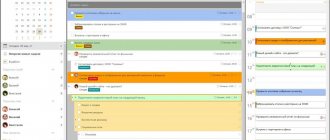— When asked: “Tell me about yourself”
It would seem that what is difficult here is to present some of the facts about one’s own person?
And yet, questions always arise: “What to talk about? How to tell? What impact will my story have?”
To begin with, it is important to understand what self-presentation is and why it is so important for a potential job candidate.
Self-presentation at an interview is a person’s presentation of himself, a story about his experience, about his achievements in order to make the right impression.
It is important to take into account the needs of the listeners. Most often, a potential employer wants to understand who you are, what you are about and what benefits you can provide.
What does self-presentation consist of and what does it include?
As you prepare for your meeting, ask yourself these questions:
- What do I know about the company? What can I give her? What use will I be? Why this company?
- Who will the meeting be held with? What does my interlocutor want to hear?
- Why should they hire me for an open position?
And consider the answers to these questions when writing the text of your short but very significant monologue.
Most often, the following plan is used for preparation:
1. Introduction: introduction, establishing non-verbal contact
2. Tell us about yourself: age, family, education, work experience, skills, achievements.
3. Highlight why you are interested in this company and vacancy, how you will be useful, what is your advantage.
Recommendations for preparing a story about yourself
Your story should be logical and progressive.
If possible, use numbers and facts that confirm your competence and success.
Do not paraphrase your resume (they have already studied it before meeting you).
Use perfect verbs: developed, implemented, completed, created, made, proposed, initiated, established, organized, etc.
Highlight why you are interested in this company and vacancy, how you will be useful, what is your advantage.
What to give up in self-presentation
- From criticism of the current company, management and colleagues
- From the information that you do not have enough experience and knowledge, but you are learning quickly
- From a detailed story about his personal life and hobbies.
Example
My name is Ekaterina Gromova. I am 35 years old, married, have an 11-year-old daughter. I am an economist by training. In 2005 she graduated from Nizhny Novgorod State University. Immediately after university I started working in my specialty. There was a break of 1.5 years - I went on maternity leave, but still continued to help the company remotely as much as possible.
She repeatedly received gratitude from management based on the results of her work, and gradually rose in the position to head of the department. She worked in large pharmaceutical companies - Russian and international.
She was involved in budgeting, operational planning, reporting, cost control, cost and cost analysis, economic analysis of individual business areas, economic feasibility studies for projects and much more.
Implemented effective reporting systems. Developed various planning and economic models for enterprise development. Established relationships between economic management and all departments of the company. Optimized the company's expenses in order to achieve a given level of profitability. Developed a plan to attract financing.
My experience in solving these problems will be useful and interesting to your company. I attended trainings every year, participated in conferences and improved my skills. I am well versed in all office computer programs. I know 1C, Parus, SAP. I am fluent in English and French, which is certainly important for you as a company with a central office in Europe.
I can say about myself that I am hardworking, attentive, organized, and effectively solve assigned tasks. My hobbies are purely feminine - I love handicrafts: I knit, sew, embroider. I am looking for a job in connection with moving to Moscow. My husband received a promotion in the Moscow office, and our family and my grandmother moved here.
Your company is interesting to me because you work in the pharmaceutical industry market, where I have experience and expertise in the field of economics. I can quickly get into it and start working. And I would like to continue to grow and develop in this direction, to bring concrete results to the business with my work.
I am interested in the position of deputy head of the department, because I myself headed the Economic Department for more than 6 years. And this was good management experience that I would like to continue to apply and develop.
I like that you have a friendly, close-knit team. It's important for me. And the fact that the company helps its employees grow and realize themselves is also valuable to me.
Thank you for listening to me carefully and with interest!
What else is important to consider so that your presentation has a positive impact on the interviewee?
Whatever you say, the old saying is still relevant: “You meet someone by their clothes . Neat clothes, clean shoes, business or casual style (depending on the vacancy), a minimum of accessories and perfume, neat makeup for women.
Self-presentation should not be long. 3-5 minutes is enough. Next, the interviewer will start asking questions and you will maintain the dialogue.
Your voice and speech. Take your time. Control your breathing so as not to swallow phrases. Watch out for filler words.
And it is very important that your breath is fresh .
Non-verbal: eye contact, facial expressions, gestures. Confident posture and eye contact, a pleasant smile in greeting. No unnecessary body movements: clicking a pen, fiddling with jewelry, accessories, hair. Moderate use of gestures.
What does the interviewer want to hear when asking this question?
The interview process is exciting and challenging.
The employer or HR person will ask questions, and you must answer quickly and confidently. Your direct task is to sell yourself at an interview, which means preparing answers in advance (we talked about what a candidate is most often asked at an interview here). Therefore, it is important to understand what to say at an interview when asked to talk about yourself.
As a rule, all questions already have the necessary answers that the employer wants to hear.
However, there are also those that can unleash your creativity and show your individuality. Often during an interview you are asked to tell about yourself.
Or, for example, you will be asked the question: “You are going to work, suddenly your best friend calls you and needs help. Your actions?" How to answer such questions?
This question is very insidious; they want to determine your responsibility and moral values.
The answer should be something like this: “Of course, this question is very sensitive. I can’t quit my job, but I can’t leave my friend in trouble either. Therefore, if I have enough time before the work day starts, I will help a friend and go to work.
If not, then I’ll involve my friends and relatives, who will save a friend, and I can work without harming the company.” With this answer you will show your responsibility for your work and demonstrate positive moral qualities.
If an employer asks you to tell us about yourself, then in this situation you need to concentrate and collect your thoughts. Self-presentation is much more complex than answering ordinary questions. Here you need to think very carefully about what to tell about yourself at a job interview.
To present yourself profitably and successfully, you need to prepare a speech about yourself in advance.
Let's look at the response plan in more detail. Where to start, how to please an employer at an interview and present yourself correctly.
What not to say at an interview
- I like to change my work activity, so I often look for work
- I quit my previous job due to low wages/due to conflicts with colleagues, manager
- Even if absolutely necessary, I will not stay late at work
- I have health problems and often take sick leave.
Leading questions for preparing a successful answer to the question “Tell me about yourself”
The difficulty in answering an employer’s question most often lies in the fact that the applicant does not know where to start the conversation. Therefore, to prevent this from happening to you, prepare your answer in advance. The following guiding questions will help you do this:
- What professional qualities do you have? Carefully study the employer's requirements for the position and think about what skills, qualities and experience you have. How do you exceed these requirements, what sets you apart from other applicants?
- Why are you interested in this vacancy? Why do you think this particular position should be the next step in your career advancement? Does the position align with your career goals?
- What got you interested in the company or this industry/field of activity? If you've spent a little time researching a company and the industry it operates in, then you've probably become familiar with its mission and goals. Now think about whether the company's goals match your professional goals? When you start preparing for an interview, try to draw a parallel between your goals, vision for the future of the company and your personal career goals and aspirations in your answer to the employer’s question “Tell me about yourself.”
- What positive qualities do you have? How do your colleagues, boss and acquaintances characterize you? Maybe as a purposeful, hardworking person? Or generous and always ready to help? Remember those incidents in your life in which these traits of yours manifested themselves.
- What skills can set you apart from other job applicants? Try to find something special in yourself and tell your employer about it. For example: “You know, I don’t work as a programmer for nothing. I remember when I was 8 years old, my parents gave me my first computer, and even then I installed programs, games myself, exchanged some spare parts for others...”
What to tell
In order not to miss anything important, it is better to plan the story in advance. What thematic blocks should it include?
Performance
Firstly, you need to start talking about yourself only after you are asked to do so.
Secondly, many sources give advice to introduce yourself at an interview only by your last and first name if you are not applying for a leadership position. However, psychologists insist that everyone also add a middle name, regardless of age and vacancy. If you introduce yourself as Masha Vasina, you can remain Masha Vasina all your life. By adding a middle name, you demonstrate self-respect and dignity. The employer will understand that in front of him is a person who values himself and demands the same from others.
People in creative professions are allowed not to use patronymics. At the same time, if there is a pseudonym by which you are known in your business, be sure to name it.
Personal data
- Age.
- Family status.
- Presence of children, their age.
- Place of actual residence. You can focus on the fact that you live close to work, so there will be no problems with how to get to it without delay.
- If registration and citizenship are important for employment, provide the employer with this information.
It is this block of the interview that is often fraught with pitfalls. The employer may start asking provocative questions such as:
- Why did you divorce?
- Why are you still not married?
- When are you planning a baby?
- How much does your wife earn?
- Will your husband let you go to corporate events?
- Have you had an office romance in the past?
If this is a stressful interview, you should answer a little boldly, with a bit of humor. If this is a regular interview, you have every right not to disclose these aspects of your personal life. Politely but firmly say that such questions do not relate to your professional competence and you would not want to answer them.
Education
- There is no need to talk about all the schools and vocational schools you attended.
- Name only the educational institution where you received your profession.
- Please indicate years of study.
- If you received an honors degree after graduating from a university or college, do not forget to mention this.
- Tell us briefly about the courses and trainings you have completed to improve your professional skills.
What to talk about
- Tell us what you learned at your last job.
- Explain how these skills will help you cope with your new responsibilities.
- Describe the experience you had while working on your biggest project.
What to avoid
- Go through all points of your education (school, university, courses). It's too much. In addition, it is unlikely that school skills will help you much at work.
- Show off your honors diploma. Its presence alone does not indicate your professionalism.
- Mention every course you've taken and every conference you've attended. Name the last one - this is enough to show that you are developing in your field.
experience
- Work experience.
- Places of work.
- Briefly describe your job responsibilities at your previous position.
- Focus on the results of your activities - successes and achievements.
What to talk about
- Select three to five recent accomplishments that are relevant to the position you are applying for.
- Briefly describe them, giving specific examples.
- Tell us about an incident from your practice that characterizes you as a professional.
What to avoid
- Restate your resume verbatim. The interlocutor can read it himself. For now, focus on what you did that was cool.
- Talk about your experience without supporting your words with examples. You might think that you are embellishing reality or even lying.
- Mention achievements that do not relate to the profession. It's great that you bake delicious buns. But this is unlikely to help you get a job as an accountant or editor.
additional information
- Proficiency in computer programs.
- Level of knowledge of a foreign language.
- Availability of a driver's license and a personal vehicle.
What to talk about
- Remember two or four useful skills that you are good at and that will be useful in a new place. If you don’t know what exactly you will have to do, choose universal ones: the ability to work in a team, the willingness to learn new things.
- Explain how these skills have helped or will help you in practice.
- Tell us how you got them.
What to avoid
- Lie about your skills. Such lies will quickly be revealed. Perhaps already at the second interview or at the stage of the test task.
- Talk about skills that are not related to work (I had a rock band, my paintings were shown at an exhibition). This characterizes you as a versatile person, but does not necessarily indicate professionalism.
- Get off with banal phrases about stress resistance and multitasking. These words mean practically nothing.
Goals
In this block, you can tell that you, for example, have dreamed of this profession since childhood, and this has become the goal of your whole life.
Formulate your goals briefly and clearly, in accordance with the position you plan to occupy. For example, say that you want to work for the prosperity of the company and grow with it.
What to talk about
- Mention goals that are consistent with the company's mission. To do this, study her website in advance. If the information you need is not there, try to imagine what the organization wants to achieve with its activities.
- Explain how the company will help you achieve these goals and how you, in turn, will help it.
- Show that you want stability and career growth.
What to avoid
- Talk about general life goals (I want to buy a house, have children and a dog). You probably already understand: it’s better to omit everything that is not related to the profession. Unless, of course, you are asked about it directly.
- Mention goals that the company cannot help you achieve. This will give the impression that you are moving in different directions.
- Say you don't have specific goals. If you don't know what you want, you may be a disorganized person who doesn't think about the long term. This is unlikely to endear you to the employer.
Personal qualities
First, tell us about your universal human qualities, which are your core and strengths. This can be activity, determination, responsibility, punctuality.
Then highlight those personality traits that are valued in this particular profession. For example, a sales manager needs to tell them about their communication skills, a general director about their leadership traits, and a teacher about their love for children.
There are also possible pitfalls in this thematic block. The employer may ask you to talk about your shortcomings. There is no need to immediately report that you have poor time management or lack of willpower. Remember that you are obliged to show yourself only in a favorable light. Therefore, the answer to the question should be with a subtle touch of humor: “Oh, I can’t live without sweets - it makes my life so difficult.”
Hobbies
You shouldn’t talk in detail about your hobbies during an interview. It's good if they work for your professionalism. For example, a journalist or copywriter may proudly announce that they are writing a book or composing poetry. You can simply say that you love diving or scrapbooking. In any case, a hobbyist is more interesting than one who has no hobby.
Reasons why you are interested in the company
This is a trivial question, but it is the one that can win the recruiter’s favor. Try to sincerely tell us what exactly attracted you to this vacancy.
What to talk about
- Say that the company's goals are close to you (and list which ones). This will show that you are close in spirit.
- Describe how your new position will help you become a better person.
- Hint that you see yourself working for this company in the future. Just don’t say that you want to lead it in N years, this is overkill.
What to avoid
- The first thing to mention is the attractive salary. Everyone needs money, but first it’s better to talk about interesting tasks, professional growth and other advantages of the company.
- Saying “I just need a job.” This will definitely not increase your credibility.
- Refer to the fact that there are good people here. You are not going to make friends, but to fulfill your duties and bring profit to the company. You can praise the professionalism of the employees and say that you want to learn from them, but do not present the future team as the only advantage.
Bottom line
You can end your story about yourself with words of gratitude for listening to you carefully. Tell them you'd be happy to answer any questions.
What to answer?
Of course, there is no universal scheme.
Even the same person can place emphasis differently at different interviews; The main thing is to present reliable events. In addition to life priorities, a story about yourself can reveal how a person’s way of thinking relates to his profession. Answers that somehow correlate with the job description always stand out favorably against the general background.
One candidate will limit himself to stating the facts (attended advanced training courses); another will add numbers to this information (number of hours listened), documentary evidence (provide a certificate), portfolio; the third will try to evaluate the events in relation to themselves (“These courses helped me a lot: I not only gained new knowledge, but also acquired very useful connections”); the fourth will express his opinion on a global scale (“In general, I believe that employees should attend such seminars from time to time; it helps to expand their understanding of what new products and trends exist, and make new acquaintances”), etc.
Employers also perceive information differently. If a performer is needed, the choice will be made in favor of the first two candidates; if the company is engaged in the education of its employees, and the vacancy involves career growth, then the third and fourth are more suitable.
This is why experts always emphasize that there are no right answers. That is, if an offer is not made, this does not mean that you said something wrong. Most likely, this job is simply not suitable for you.
Aliya Belyaeva , career consultant and job search mentor at Job Search Coach, editor-in-chief of the electronic magazine “Career for the Soul,” recommends something like this:
- Briefly describe your overall work experience;
- talk about the main results and achievements of recent years;
- give examples of knowledge and skills that will be in demand in the new position;
- smoothly move on to the reason for looking for a job and report on why you are interested in the vacancy.
Here is one of the indicative diagrams: “My total experience in sales is more than 6 years.
I started as a sales manager, now I am the head of the sales department. My last place of work is a distribution company, where I have more than 30 people under my supervision. The main result over the past year is a 30% increase in sales. I managed to do this thanks to the accumulated experience, knowledge and skills in building a sales system and raising team spirit in the team. Currently, I realized that I have reached the limit of my professional growth in this company, and I want to move on. That’s why I was so interested in the vacancy in your company, and I would like to learn about it in more detail.” Add more specifics, spice up the story with examples, and you'll get a good answer.
The candidate will be favored by the absence of repetitions, fairly short but succinct phrases, the presence of examples, figures, facts, results, as well as positive wording. Accordingly, general phrases, a lengthy narrative and a lot of negativity (for example, bad reviews about previous employers or colleagues) can work against him.
At the same time, we should not forget that such dry schemes are not suitable for all vacancies: if you have creative work to do or are trying to get a job in a youth group, then a more creative approach is needed. However, it is also important not to overdo it.
Elena Belova, recruitment consultant at CONSORT Group International Executive Search Federation (IESF), adds: “Since the likelihood of being asked to talk about yourself is very high, it is better to prepare for it in advance. I’m not a supporter of socially desirable answers, so I don’t think it’s right to prepare template monologues for HR specialists, but you shouldn’t rely on complete improvisation either. Every applicant should understand that it is necessary to prepare for an interview in any case. But this preparation should not consist of memorizing the “correct” answers, but of carefully studying the vacancy, the set of job responsibilities, trying to find out something about the company you are going to, analyzing your work experience and thinking about how best to learn about it tell. This will allow you to demonstrate interest and awareness of the organization’s activities, its place in the market, etc. during the interview, as well as more convincingly emphasize your suitability for the vacancy.
Whatever your relationship with your previous employer, you should not try to explain to the new one how you were misunderstood, misappreciated, and treated poorly.
In addition to life priorities, a story about yourself can reveal how a person’s way of thinking relates to his profession. For example, it is good if a sales manager operates with data on sales volume, percentage of plan completion, reporting territory, etc. The speech of the head of a department or department will benefit from facts, figures and specific situations, as well as analytical statements. As a rule, this indicates a focus on results.
Answers that somehow correlate with the job description (job responsibilities, requirements) always stand out favorably against the general background. It’s very nice when a candidate talks about his professional achievements in relation to the position, identifies similarities and differences, and similar tasks. In such cases, it becomes clear that he is at least really interested in the job offer and is motivated by functionality.”
The selection specialist understands that for some time the new employee will join the team and delve into the work processes. Accordingly, of the two applicants, preference will be given to the one whose adaptation will be faster, that is, the person who was not too lazy to learn something about the company.
Recruitment manager at Emerging Markets Group (EMG) Ksenia Rodina agrees that “as such, a narrative scheme does not exist unless it is offered by an HR specialist to guide the applicant in the right direction, clarify certain points, and reveal what he may have been hiding . But you can try to emphasize the facts that reflect the result of the activity, but value judgments can be harmful if they do not coincide with the opinion of the recruiter. Negative reviews about your previous work are especially harmful.
In order not to get lost, the story about yourself can be structured in advance, but if you are asked provocative, situational questions or questions to identify competencies, then the flow of the story may be disrupted and the vector of communication is directed in the other direction. You need to be prepared for such a development of events; The main thing is not to be nervous, not to react aggressively.”
Structure of a monologue about yourself
Before you start surprising the HR manager with your achievements, you need to correctly structure your answer.
Outline of the monologue “about myself”:
- How do you stand out from the rest of the candidates?
- Your responsibilities at your previous place of work or the goals that were set for you;
- How exactly your skills helped the department or company.
To make it easier for you to understand the principle, we have prepared several examples.
Project Manager:
| What can you tell us about yourself? |
| In my activities, I always use planning and clearly structure all information. In the company where I worked a year ago, all document flow was in paper form. Project management involved several managers who distributed responsibilities and reported progress to management at daily meetings. Many customer requests were lost with this approach, and the company suffered losses. I proposed to implement a project management system based on the use of appropriate software - Microsoft project, Primavera, CRM. Thanks to this, we were able to reduce the number of project meetings to once a week. Sales increased by 30%, the number of customer complaints and negative reviews about the company decreased. The company began to actively develop and doubled its sales staff. |
Graphic Designer
| Tell us a little about yourself. |
| I have always stood out for the originality of my ideas and personal approach to the customer. I received two orders from large online stores. It was necessary to develop a logo, corporate identity and business cards for the employees of these companies. I was very limited in terms of time, and the company had no experience in working with these customers. Despite the high workload, I was on time and both clients were very pleased with the result. To confirm this, they sent letters of gratitude and entered into long-term contracts with our company for a total amount of more than 2 million rubles. |
Accountant
| Tell me about you. |
| I always try to develop in my profession and learn something new. For example, at the previous place where I worked, accounting was done on paper and in Microsoft Excel spreadsheets until 2015. For obvious reasons, this was very inconvenient, and a lot of resources were spent on simple tasks. At the beginning of 2015, management decided to implement the 1C: Accounting system. I immediately signed up for the relevant courses and successfully completed them. After the system was implemented, work became much easier. The time required to calculate employee salaries has been reduced from one week to two days. And thanks to the knowledge I acquired, I received a promotion to assistant senior accountant. |
Again:
Any statement must be accompanied by facts. Do not say:
“I can do this or I am such and such.”
You will stand out from the rest if you say:
“This is what I can do, and this is how my skill has helped my department.”
Using numbers is one of the main rules of any marketer. It draws attention to the text and inspires confidence in what is said.
Just don't overdo it.
Remember the old joke: “According to statistics, 87.52% of statistics come out of nowhere.”
.
Employers remember her too. There will be much less confidence in such exact figures. Approximate values are sufficient.
What does the interviewer pay attention to?
It is important for a potential employer to understand how well you correspond to the proposed position both in terms of professional skills and in terms of human qualities and values, because you will have to join an already established team.
Your interlocutor evaluates how confidently and clearly you speak, how you maintain contact in communication, how you evaluate the results of your work and why you decided to work for this company.
What should you not do when applying for a job?
Most applicants make a number of mistakes during job interviews that can be completely avoided. The most common ones are:
- Unflattering reviews about your previous place of work, colleagues or superiors. You shouldn’t talk badly about your past job, because you got it of your own free will, and not “by the will of fate” or under the pressure of insurmountable circumstances. A potential employer may decide that you will subsequently not say anything good about his company or him personally either.
- Describing your personal life and things not related to work in too much detail. You can talk about nature, weather and oil prices during your lunch break if you get hired.
- Doubt about your abilities and professional qualities. If you doubt yourself, how can a future employer appreciate you?
A correct story about your skills, experience and achievements is, of course, good. But to create an overall positive picture for the employer, it is important not only to convey the meaning of the text to the recruiter, but also to behave correctly when doing so.
You need to talk about yourself with a smile and confidence in what you say. Don't lounge in your chair, don't cross your legs, don't cross your arms. Talk only about what is interesting to the employer. Don’t include too much praise about yourself in your story, don’t exaggerate your achievements and skills - and you will achieve results.
Friendly and business-like behavior, self-confidence, and the right story about your personality are important components of success in a job interview.
How to behave during an interview
These simple recommendations will increase your chances of getting a job in the company you want.
- Don't be late, punctuality says a lot about the applicant. In addition, by arriving at the place in advance, you can have time to get used to the situation and draw some conclusions before the conversation begins.
- Know how to listen: do not interrupt the recruiter under any circumstances. Answer his questions clearly and only to the point.
- Speak confidently and calmly. Avoid the phrases “Probably”, “Maybe”, “I don’t know”, “I guess”, etc. These words indicate that the person does not fully understand what he is saying and does not believe in himself too much.
- Speak loudly enough and at an average pace. A quiet voice and too slow (as well as too fast) speech create the impression of nervousness, uncertainty, and low self-esteem.
- The style of communication is formally businesslike. No informal language, familiarity or jargon.
- During the interview, the recruiter may ask awkward questions, be too harsh, and provoke the interlocutor. The purpose of these actions is to check a person’s behavior in unusual situations, find out the speed of his reaction, and see the level of aggression. You need to react to such attacks evenly.
- Questions about your personal life will definitely be asked. In order to find out whether it will interfere with work. It’s worth thinking about answers in advance that would reassure a possible employer in this regard.
- It is important to answer questions about your salary honestly, without lowering the bar or feeling awkward. It is recommended to add approximately 30% to the previous salary and agree to a salary that is at least 10% higher than the previous one.
- If a recruiter is interested in your hobbies and interests, this does not mean that he wants to listen to a detailed, long story about how you live. A person just wants to make sure that the applicant spends his free time in the same way as most adequate people. A couple of succinct phrases (without unnecessary emotions and details) will be quite enough.
- Prepare a story in advance about your achievements (with examples in the form of complex problems you have solved).
- It is important to be careful with questions about overtime: if you agree to work from morning to evening and on weekends, there is a high probability of becoming almost a slave. It is better to answer that, if necessary, you agree to processing, but this should not interfere with your personal life. And ask counter questions about the duration of excess time and its payment.
Important!
Under no circumstances should you “throw mud at” your previous place of work: your functions, salary, management, etc. This always leaves a negative impression on the interviewer.
How to practice self-presentation before an interview
So, you have prepared the text. And you like him.
- Read it out loud several times. How easy is it to read? How natural does your story sound? Are there long sentences that take your breath away?
- Record yourself sight reading. Listen. Adjust if something doesn't sound right.
- Tell the presentation several times to an imaginary interlocutor. Don't memorize, try to improvise. And record yourself again. If you hear shortcomings, correct them.
- Ask someone close to you to listen to you. Imagine that you are with an employer. Sit on a chair and talk about yourself. Get an analysis from the observer of whether there was eye contact, what kind of facial expressions there were, what happened with gestures, with bodily manifestations, with legs.
- An even more advanced option is to film yourself and see and hear your monologue with your own eyes.
How should you present yourself during an interview?
pixabay.com
Paraphrasing your resume
Many candidates respond by simply reading their resume from beginning to end. This can turn into a very long monologue that starts with the oldest and probably least important and impressive. By the time you get to the good stuff, your interviewer will have fallen asleep and already cast someone else for your role.
It is important to prepare a summary of the main points of each of your past positions. It is likely that you will be asked about your achievements and day-to-day responsibilities in previous positions. Ideally this should sound like this. like an exciting conversation, and not like a long monologue from the first seconds.
And yes: you don’t need to talk all the time about the fact that you have a diploma. Once is enough.
Mr and Mrs Modesty
pixabay.com
Many job seekers make the mistake of showing their modesty when interviewed. They start with a modest or vague introduction that lacks a clear message of their strongest qualities.
They are afraid to characterize themselves as unique employees who are not just needed by this company, but necessary - and this is very bad.
Some of these people are just shy people who don't feel comfortable "selling" themselves. Others simply never had to worry about how to present themselves - new opportunities were always chasing them, and the job market was not so competitive.
First date feeling
pixabay.com
No, this is not the first date. Your interviewer doesn't want to hear that you like Mojitos and hanging out in the rain. Many college graduates misinterpret this question and talk too much about their personal lives and hobbies.
You need to describe yourself wisely: in these types of interviews, it is much more interesting to know who you are as a person. In interviews, focus on who you are as a professional unless you are asked about hobbies or activities outside the home.
- Author: Marina Tikhomirova
Tell a positive story about yourself during an interview
My name is Mikhail, I am 38 years old, married. Graduated from a polytechnic university with a degree in “...”. The vacancy will allow me to constantly improve and improve my professional skills. I am sure that I can be useful, I am good at.....
I love teamwork, I easily grasp new knowledge, I am responsible and goal-oriented, I can multitask.
In my free time, I spend time with my family and coach my son to play basketball. The love for travel is so strong that I will never give up business trips.
An example of an unsuccessful story about yourself at an interview
“I’m Maria, I’m 32 years old. Not married, has 2 children. My hobby is crocheting. I am currently working, but the low salary and constant delays in payments do not suit me. I would like to get a job as a sales manager for you. I am sociable, sociable, I am not entirely punctual, and I am ready to do anything to fulfill the sales plan. Because of my stubbornness, there were conflicts with my superiors.”
An example of a story about yourself at an interview if you have no experience
“This year I graduated from Moscow State University with a degree in Chemical Technology of Organic Substances.” During my studies, I did not work because I devoted myself entirely to my studies. I was the head of the group, received an increased rating scholarship for my services to science. I did an internship at a chemical plant, and I had the opportunity to put into practice the theoretical knowledge I acquired at the university. I want to work for you as a chemical engineer, I am ready to learn and gain experience from highly qualified employees of your company.”
Appearance
I would like to note that even if you know how to correctly talk about yourself at an interview, you should not forget about your appearance. When going for an interview, choose a business style that looks the most advantageous. Apply modest makeup in pastel colors. It is advisable to collect your hair or do a discreet styling.
Getting your dream job is a difficult but interesting process. You just need to prepare for the interview and approach this issue seriously and responsibly, studying the company’s activities and preparing a successful and “talking” self-presentation. Remember, everything is in your hands! Moreover, now you know what to tell about yourself at an interview.
What should you say at an interview to get hired?
“You won’t have a second chance to make a first impression,” said the legendary Coco Chanel about appearance.
The catchphrase also applies to self-presentation.
By inviting you for an interview, the employer provides the only chance to convince him to give the coveted position to you.
What to say at a job interview, how to present yourself to the employer competently? Good self-presentation requires preliminary preparation and does not tolerate impromptu. Think in advance about what to tell about yourself at the interview, make a plan for the story and rehearse in front of the mirror, controlling your facial expressions and gestures.
Important! The employer pays attention not only to your speech, but also to your appearance.
Remember the 30 second rule - you have half a minute to please the employer, don’t drag out your story, keep it short and to the point. The main rule is little, but to the point. Stick to the plan, but do not memorize the text, otherwise it will be uninteresting to listen to you. You will find examples of what to tell about yourself at an interview later in the article.
What to write in the “about yourself” section of your resume
Now remember that you have a section of the same name in your resume. There is no need to try to fit “War and Peace” into it. You can tell us about yourself in more detail, but here a few sentences will suffice:
| Right |
| Working in a team inspires me. At my last job, I organized a working group to optimize the process, which helped reduce the number of customer objections, improving company reviews and profits by 15% in the first 3 months of work. |
Do you have many achievements and don’t know which ones to highlight? The principle is this: first of all, talk about those most suitable for the new position.
About goals: show that you are on your way
Bad idea:
- talk about personal goals;
- demonstrate that you do not have clear career goals;
- identify goals that you will not be able to achieve in the proposed position.
Good idea:
- identify goals that the company can help you achieve;
- demonstrate your foresight;
- show that you want to build a stable career.
Make sure you are focusing on your career goals and not your life goals. Otherwise, the interviewer will simply not be interested in listening to you, and in the worst case, he will hear something that will reduce his chances of taking the position.
Don't forget that the employer evaluates not only how good you are for the company, but also how good the company is for you. If you have a clear and worthy goal, but you cannot achieve it by working in the proposed position, the chance of refusal is high.











